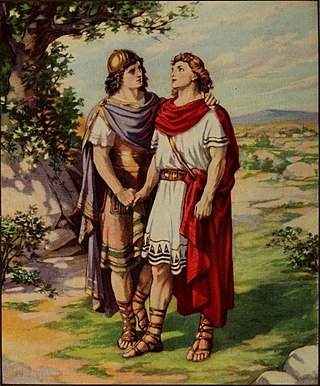Related Research Articles

Jonathan is a common name given to males which means "YHWH has given" in Hebrew. The earliest known use of the name was in the Bible; one Jonathan was the son of King Saul, a close friend of David.

Adam is a common masculine given name in the English language, of Hebrew origin.
Steve is a masculine given name, usually a short form (hypocorism) of Steven or Stephen.
Nick is a masculine given name. It is also often encountered as a short form (hypocorism) of the given names Nicholas, Nicola, Nicolas, Nikola, Nicolai or Nicodemus. It may refer to:

Brian is a male given name of Irish and Breton origin, as well as a surname of Occitan origin. It is common in the English-speaking world.
Chris is a short form of various names including Christopher, Christian, Christina, and Christine. Chris is also used as a name in its own right, however it is not as common.
Ian or Iain is a name of Scottish Gaelic origin, which is derived from the Hebrew given name יוֹחָנָן and corresponds to the English name John. The spelling Ian is an Anglicization of the Scottish Gaelic forename Iain. This name is a popular name in Scotland, where it originated, as well as in other English-speaking countries.
Lewis is a surname in the English language. It has several independent origins.
Gavin is a Celtic male given name. It is the Scottish variation of the medieval Welsh name Gawain, meaning "God send" or "white hawk". Sir Gawain was a knight of King Arthur's Round Table. Sir Gawain and the Green Knight is an epic poem connected with King Arthur's Round Table. Gawain beheads the Green Knight who promptly replaces his head and threatens Gawain an identical fate the same time next year. Decapitation figures elsewhere: the Italian name Gavino is the name of an early Christian martyr who was beheaded in 300 AD, his head being thrown in the Mediterranean Sea only later reunited and interred with his body.
Aaron is an English masculine given name. The 'h' phoneme in the original Hebrew pronunciation "Aharon" (אהרן) is dropped in the Greek, Ἀαρών, from which the English form, Aaron, is derived.

Paul is a common Latin masculine given name in countries and ethnicities with a Christian heritage and, beyond Europe, in Christian religious communities throughout the world. Paul – or its variations – can be a given name or surname.
Ryan is an English-language given name of Irish origin. Traditionally a male name, it has been used increasingly for both boys and girls since the 1970s. It comes from the Irish surname Ryan, which in turn comes from the Old Irish name Rían. Popular modern sources typically suggest that the name means "Little king", but the original meaning is unknown. According to John Ryan, Professor of Early and Medieval History at University College Dublin, "Rian, like Niall, seems to be so ancient that its meaning was lost before records began."

Joel or Yoel is a male given name derived from יוֹאֵל Standard Hebrew, Yoʾel, Tiberian Hebrew, or Yôʾēl, meaning "Yahu is god", "YHWH is God", or the modern translation "Yahweh is God". Joel as a given name appears in the Hebrew Bible.
Events from the year 1984 in the United States.
Events from the year 1987 in the United States.
Kyle is an English-language given name, derived from the Scottish Gaelic surname Kyle, which is itself from a region in Ayrshire.
Drew is both a surname and a given name. A son of Charlemagne had that name, and it became popular in France as Dreus and Drues. Another source was the county of Dreux, also in France, ruled by the Counts of Dreux from the 12th century onward. The name was introduced to England by the Normans, in 1066 at the time of the Conquest, and is first found there in the Domesday Book. Another derivation is from the Irish Ó Draoi, literally meaning "Descendant of the Druid". As a male given name, it can be a shortened version of Andrew.
References
- ↑ Meaning, Origin and History of the Name Jonathan. Behind the Name. Retrieved on 2013-09-06.
- ↑ Meaning, Origin and History of the Name John. Behind the Name. Retrieved on 2013-09-06.